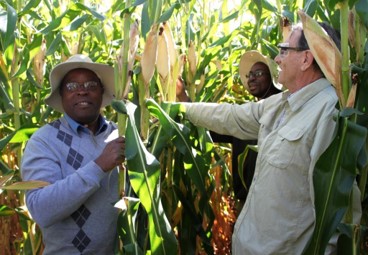
(Nairobi, Kenya, May 2024): African countries have been challenged to boldly push for the adoption of cutting-edge science in agriculture and the use of improved seed systems if they are to overcome the challenge of feeding a growing population under stressful climatic conditions.
In an engaging guest editorial published in the African Journal of Food, Agriculture, Nutrition and Development, Dr. Sylvester Oikeh, Senior Maize Scientist at the Nairobi-based AATF, and the Project Manager for the TELA Maize, calls for an aggressive push by governments and scientists to confront effects of climate change, pests and diseases and low productivity using available scientific methods.
Currently, drougsourcesess and associated insect-pest damage pose a huge threat to food and nutrition security for over 300 million people in Africa who depend on maize as their main food source.
“Recurrent drought events cause an annual 17 to 25 percent yield loss of maize in Africa. Compounding the impact of drought is the ravaging effect of insect-pests infestation on maize production, especially for pests whose population pressure is highly triggered under dry conditions,” he notes.
The crop under weakened conditions created by drought stress and pests he further says becomes constrained biologically and physiologically, thus limiting the crop’s ability to use already limited water and nutrients from the soil.
Dr Oikeh notes that in addition to maize yield loss, severe damage by both insect pests predisposes the crop to the development of mycotoxins (aflatoxins) caused by fungal disease. This affects the quality of the grains for human and livestock consumption if not adequately controlled in the field.
It is through such threats that various initiatives, Dr Oikeh notes have been rolled out like the Water Efficient Maize in Africa (WEMA). This program was created in 2008 to develop and deploy new drought-tolerant and insect-resistant (climate-resilient) maize varieties for smallholder farmers through an innovative public-private partnership (PPP).
“The partnership based on scientific evidence considers that the products of biotechnology can contribute to Africa’s food and nutrition security; and relies on global regulatory standards of evaluations to confirm their safety,” he adds.
The WEMA program was first defined to guide product development with a focus on ensuring white maize varieties achieve a 25 percent yield improvement compared with the 2008 varieties under moderate-drought conditions. The target was first to achieve a 15 percent yield advantage through conventional breeding over 10 years; followed by an additional 8–10 percent yield advantage through genetic engineering (GE).
Dr Oikeh points out various efforts that have been made to develop varieties through genetic engineering in the TELA maize project that involves enhancing the available conventionally developed drought-tolerant maize hybrid varieties with insect-resistant gene, known as Bt gene sourced from Bacillus thuringiensis, a soil bacterium being used in organic crop production for pests control.
The TELA® varieties with Bt gene are already making significant impacts among smallholder farmers in South Africa since they were registered for commercial release in 2016, he said. He further indicated that some TELA® hybrid varieties are available that combined both insect-resistance and drought tolerance genes to make them more climate smart to the combined effects of drought and insect pests.
The drought tolerance (DT) gene known as cold shock protein (CspB) or MON87460 (DroughtGard®) was sourced from Bacillus subtilis, a soil bacterium that has a long history of safe use in the fermentation industry to produce natto (fermented soybean) in Japan and to produce condiments such as dadawa (fermented African Locust Bean; Parkia biglobosa) in Nigeria.
Dr Oikeh concludes, “Securing approvals for the general releases of transgenic crops such as TELA® maize in Africa may appear difficult and complicated, but it is not impossible if the requisite legal and regulatory frameworks at country levels are accompanied by consistent and supportive political goodwill.”
########
About AATF (www.aatf-africa.org)
Founded in 2003 to address Africa’s food security prospects through agricultural technology, AATF believes that the agricultural sector is a key foundational pillar as Africa consolidates its economic growth and carves out its new position as a major global economic powerhouse and the next growth market in the world. It was formed in response to the need for an effective mechanism that would facilitate and support negotiation for technology access and delivery and the formation of appropriate partnerships to manage the development and deployment of innovative technologies for use by smallholder farmers in Sub-Saharan Africa.
For more information contact: George Achia, Communications Officer, East and Southern Africa, AATF; g.achia@aatf-africa.org +254 785334163


















































































